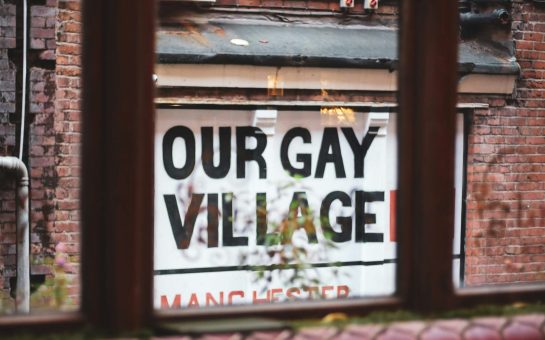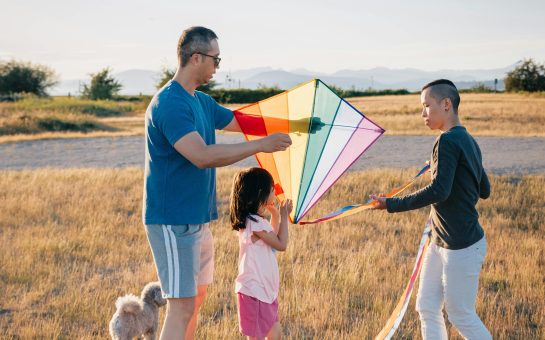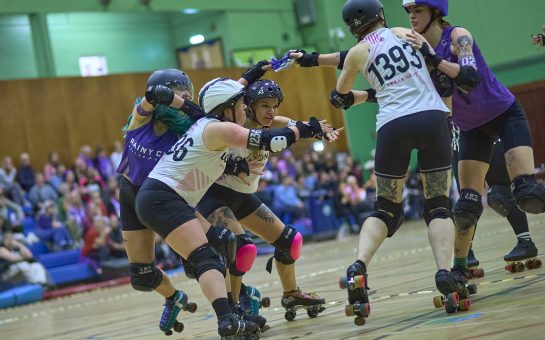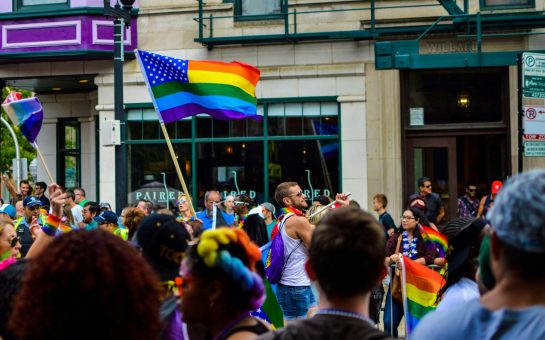To celebrate LGBT History Month, MM talk to LGBT figures from across Greater Manchester about their experiences of coming out and what progress they think the city still has to make towards equality.
Yesterday we spoke to Adam Zane, the artistic director for Manchester’s Hope Theatre Company. Adam, an MMU graduate, who also starred in Queer as Folk, opened up about growing up gay in the eighties and nineties and the changes he’s seen in the Village over the last 20 years.
The baton is passed today to one of Canal Street’s most recognisable icons, Misty Chance. The Manchester-based drag artist is a familiar face in the Village for her quizzes, karaoke and cabaret.
Misty also works as an ambassador for the George House Trust, the voluntary organisation supporting people living with and affected by HIV in the North West. In her personal life, she’s a keen Trekkie and any followers of her Twitter will be well aware of her love for Patrick Stewart.
How old were you when you first realised you were L/G/B or T?
I’m pretty sure that I always knew, but I can never remember a time when I considered girls as potential partners. I had a younger brother and the clear differences between the way we acted and the things we were interested in only seemed to confirm the fact that I was not the same as most of the other boys around me.
I also had a younger sister who I indentified with much more – to the point of switching all her Barbie dolls with my Thundercats.
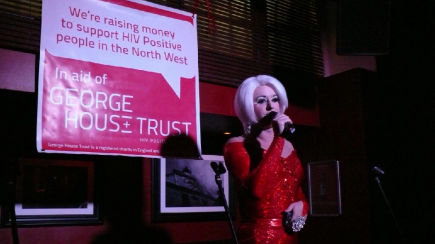
AMBASSADOR: Misty is also a representative for Manchester-based HIV charity George House Trust (©Misty Chance, via YouTube, with thanks)
Could you tell us your ‘coming out’ story?
I possibly have one of the easiest coming out stories of all. With regards to telling my mother, there was no stress or unexpected reactions at all. My early adolescence was a little unusual because for a part of it I was home schooled and wheelchair bound for more than 12 months following a road traffic accident.
I had never really hidden my flamboyant nature previous to this whilst at public school, which did lead to one or two bullies trying their luck. These attacks came to an abrupt end when my dad turned up at the school yard gates with our Doberman, Ben, and told the kids that the dog wanted to know who had been flushing my school books down the toilets. It never happened again.
Unfortunately, my brother and sister didn’t survive the car accident so I was brought up from there on as an only child, being treasured and doted upon as my mother perhaps overcompensated.
We were always close, my mother and I, and I would go shopping with her (by choice!) whilst my brother Jordan used to go to football practice with my dad. I was a super mummy’s boy and I knew that when it was time to come out, she wouldn’t have an issue with it.
My dad of course proved to be a different story but for various reasons, irrelevant to this question, his opinion was not of great importance to me.
Once I had fully recovered from the accident, my family bought their first pub, a working class gentleman’s boozer, and it was a daily occurrence for of one of the lads from the footy or snooker team to call me a poof as I passed through the bar on my way to school.
If ever my mother caught wind of them doing this she would bar them on the spot. She ran the place in a very Thatcheresque manner and in general our customers accepted my obvious dramatic flair, mainly because if they didn’t, Burnley’s answer to Peggy Mitchell would be on their case.
I was very well protected and I was calm and comfortable with the knowledge that I was gay – I had simply decided not to announce it until I had actually met a guy.
The night that I kissed a boy while out clubbing in Burnley was the night I came home and told my mother that I had kissed someone, and that he was also called Christian. She asked if I liked it, I said yes, and then she told me to go downstairs and get us a couple of beers out of the cooler and some bacon fries. I was subsequently with Chris for three years before moving abroad.
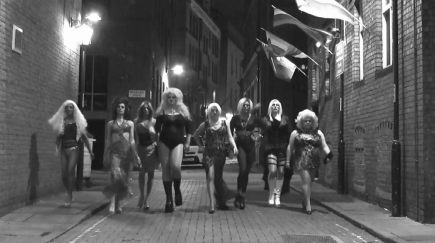
MANCHESTER QUEENS vs FACEBOOK: Misty attacked the social network in September for stripping drag artists of their names
(©Misty Chance, via YouTube, with thanks)
From coming out to now, what are lessons you have learnt about yourself with regards to you and your sexuality?
Even in my later years of schooling, I was sure of two things, even though I couldn’t quite explain how I was going to achieve them. One of them was that I was going to get married by the age of 25 and the other was that I was going to have children by the age of 30.
All this must have sounded strange coming from a 15-year-old boy but I was never in any doubt. When my career plans took a sudden change of direction and I started doing drag in my early 20s, I was still adamant that my goals would stay the same, yet when my job demanded that I settle in a prominently gay area, my future plans unfortunately became seemingly unobtainable.
The biggest lesson I keep with me since coming out is that as ‘normal’ as we are allowed to be now by our peers, our government, our laws and to an extent, even our church, the lifestyle of a scene-dwelling homosexual is far from a traditional wedlocked 2.4 children utopia – what I was brought up wanting and believing in.
That’s not to say that there isn’t the odd exception, there always is, but a large part of their achievement is used up constantly reminding the rest of us how happy they are via social media. You’ve heard the expression ‘the lady doth protest too much’?
For me it came down to one simple decision. On a condensed alcohol-laden gay scene like Manchester, the primary mission is to have fun. Going to work is just the inconvenient thing its inhabitants have to do to get enough money to be able to afford that fun.
It seems to me that you cannot do both an incredibly involved and professional job AND party hard on a scene centred on drinking, conquest and recreational drugs. In my case (swap the partying for settling down), I chose to concentrate on my career and abandon the original map I had drawn out for myself back in my school days.
Now, at 34 years old, I can picture a time when I will turn around and suddenly I will be an old Queen, possibly alone, possibly with no continuation of my family name and possibly regretting that I decided to put all my energy in to my work – possibly! Time will tell, but that’s a future lesson.
Catch me here: pic.twitter.com/rE7GB3ASXR
— Misty Chance (@themistyshow) February 4, 2015
What are the biggest challenges still to overcome in the UK for the LGBT community?
I very much feel that in the UK we are on the right track and are really setting a wonderful example to the rest of the world. Basic human rights are afforded to us all in our country and the few remaining old-school laws that excluded the LGBT community are slowly now catching up.
These sorts of things take time, but I’m confident that we will have a blanket rule for everyone across the UK regarding things like marriage, adoption and blood donation within the next ten years or less.
And what about for the rest of the world?
The one thing that will always interfere and attempt to keep the LGBT community and indeed the general population from moving forward is religion.
I used to find people’s blind unwavering faith and belief in the unphysical quite inspirational but as we as human beings have become more knowledgeable about the world around us and scientific fact explains our genetics and social behaviours to us, there seems less room for ancient texts and messiahs in today’s society.
Atrocities like gay men being thrown from the tops of buildings and schoolchildren being suspended because they have come out are events which we can only watch through our fingers in horror. We simply can’t identify with this kind of persecution in our country.
Those heinous acts clearly need addressing by their respective leaders and I don’t think that that there are any definitive solutions, certainly none that wouldn’t end with conflict.
There is and should be room for all kinds of thought and diversity in this world, but there does come a time when it might be necessary to intervene, and perhaps this is one of them?
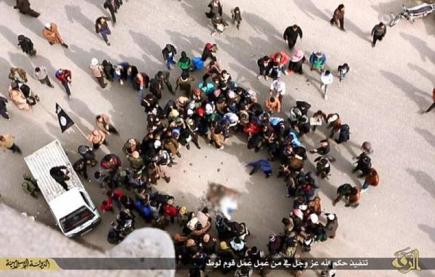
‘WATCHING ON IN HORROR’: Religion is the cause of videos like this, which show a gay man thrown off a tower block roof and then being stoned after surviving the fall, claims Misty (©Live Leak, with thanks)
What would you say to your young self or a young LGBT person with the knowledge you have now about coming out?
The act of coming out is actually one of great joy. It changes everything about the person, and I would liken it to putting on my makeup, or more appropriately, removing it at the end of the evening. No more pretending, no more acting how you’re expected to act, no more doing things that don’t come natural to you.
I would say savour it and also do it as soon as you feel ready. You often hear of people coming out late in life and cursing themselves for wasting a large portion of their real existence.
For me personally, I would have assured myself that I had more support beyond my immediate family before exploding out of the closet.
People you don’t know intimately like casual acquaintances and work colleagues harbour all kinds of opinions which you may not be aware of. These are also people that you can remove from your life should you find that you are no longer compatible – that is worth remembering.
How does being gay impact on your job/career?
Though being a drag queen doesn’t require the performer to be gay, I have yet to meet one who isn’t. Being gay myself and having been around the block once or twice stands me in good stead when it comes to dealing with requests for information and advice from ‘the next generation’ of young gay people who sort of see a drag queen as some kind of matriarchal figure.
I suppose if I was straight, then I would be less equipped to handle such enquires, and though it isn’t exactly in my job description, I’m happy to help newbies help if I think I have something positive to offer them.
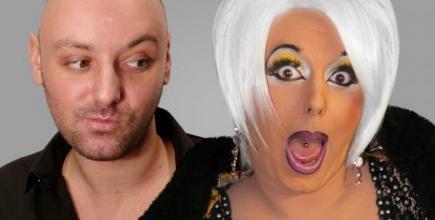
THE MAN BEHIND THE WOMAN: Misty Chance is the moniker behind Christian James D’Arcy, who says she’s never met a drag queen who isn’t gay (©Misty Chance, via YouTube, with thanks)
What are your thoughts on Manchester’s LGBT scene? Is the Village still the heart of it in your mind?
I have been in and worked in many LGBT areas all over the world from Malaga to Sydney, and though they are all cosmetically different, at heart they are all pretty much the same. How good they are all depends on what your role within the scene is going to be and your reasons for being there.
For community and a familiarity of the likes I have never seen anywhere else, Manchester wins hands down.
Our Gay Village is almost like a mini eco system, with generational bars, price ranges to cater for every class and a distinctive yin and yang feel. Every time there’s a break up or a dispute you often hear people say ‘well, that’s the Village for ya’, but I suspect the individuals who say that would be having troubles even if they lived in Eden itself.
The Village can be a dark place, but only if your mind is in a dark place. There are ways and means of staying out of mischief and it takes people skills.
Be respectful to others; acknowledge their differences; call it a debate not an argument; call it ‘getting to know’, not ‘in a relationship’; and every once in a while, take a step back and analyse your drug intake – it’s easier than ever to become an obituary around here.
What makes Manchester a good place to live in for members of the LGBT community?
Over on the good side, to quote the song from Cheers, ‘sometimes you want to go where everybody knows your name’, and as we all seem to live in each other’s pockets – both whilst out in the Village and from home on social media – our business becomes public knowledge.
Manchester’s Village is one of the only places I have ever lived where I could be having an ‘off’ day at home, head to the Village alone (even with no money) and end up eating, drinking and having interesting conversation by giving nothing more than a verbal IOU to any given venue owner.
Perhaps that’s partly due to my job and being employed by most of them at one point or another, but still, that truth always delights me. The businesses of the Village are very supportive of things like charity, campaigns for safety, public social events and even of each other. You can often see one venue rolling a barrel of beer down Canal St as they lend it to a neighbouring bar.
The LGBT community has pushed further into the city than ever before with events such as Manchester Pride, Fringe festival and Queer Contact theatre performances, a sure sign of a great diverse modern society.
The people that live and work in and around Canal St are viciously protective of the area and the customers who use the street enjoy the benefits of this community spirit and if they love Manchester’s LGBT community, it will love them back. Canal Street and its surrounding area is, in my opinion, the best gay scene this country has to offer.
Image courtesy of Misty Chance, with thanks
